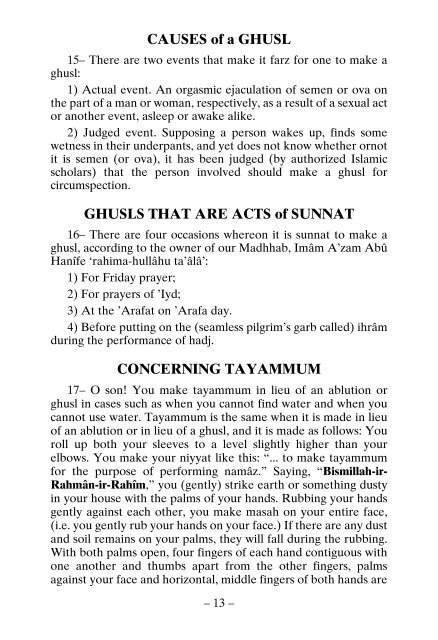O Son !
THE BOOK ‘O SON’ Al-hamdu lillâhi Rabbil ’âlamîn. Wa-s-salâtu wa-s-salâmu ’alâ Rasûlinâ Muhammadin wa Âlihi wa Sahbihi ajma’în. 1– O son! Collecting from books written by the scholars of the Hanafî Madhhab three hundred and sixty hadîth-i-sherîfs and forty-four khabars and also the seven essentials and the five rukns and the seven wâjibs and the fourteen sunnats and the twenty-five mustahabs and the fourteen mufsids of namâz, I have explained them for you. Adapt your acts and deeds to these teachings so that you attain fayz and nejât (salvation)! 2– Also for your information, I have collected a thousand and ninety âdâb (adabs) for you and for other young Muslims like you. If you adapt your actions and acts of worship to these teachings, they will be sufficient for you. If you laze, disobey Allâhu ta’âlâ and cease from these practices and manners, you will be afflicted with slavery and disgrace in the world and subjected to torment in the world to come. If you live up to them and advise your Muslim brothers to do the same, it will be useful for you. They will say blessings over you. And Haqq ta’âlâ will accept their invocations. For, a slave will be pardoned on account of another slave’s invocations for them.
THE BOOK ‘O SON’
Al-hamdu lillâhi Rabbil ’âlamîn. Wa-s-salâtu wa-s-salâmu ’alâ
Rasûlinâ Muhammadin wa Âlihi wa Sahbihi ajma’în.
1– O son! Collecting from books written by the scholars of the
Hanafî Madhhab three hundred and sixty hadîth-i-sherîfs and
forty-four khabars and also the seven essentials and the five rukns
and the seven wâjibs and the fourteen sunnats and the twenty-five
mustahabs and the fourteen mufsids of namâz, I have explained
them for you. Adapt your acts and deeds to these teachings so that
you attain fayz and nejât (salvation)!
2– Also for your information, I have collected a thousand and
ninety âdâb (adabs) for you and for other young Muslims like you.
If you adapt your actions and acts of worship to these teachings,
they will be sufficient for you. If you laze, disobey Allâhu ta’âlâ
and cease from these practices and manners, you will be afflicted
with slavery and disgrace in the world and subjected to torment in
the world to come.
If you live up to them and advise your Muslim brothers to do
the same, it will be useful for you. They will say blessings over you.
And Haqq ta’âlâ will accept their invocations. For, a slave will be
pardoned on account of another slave’s invocations for them.
You also want an ePaper? Increase the reach of your titles
YUMPU automatically turns print PDFs into web optimized ePapers that Google loves.
CAUSES of a GHUSL<br />
15– There are two events that make it farz for one to make a<br />
ghusl:<br />
1) Actual event. An orgasmic ejaculation of semen or ova on<br />
the part of a man or woman, respectively, as a result of a sexual act<br />
or another event, asleep or awake alike.<br />
2) Judged event. Supposing a person wakes up, finds some<br />
wetness in their underpants, and yet does not know whether ornot<br />
it is semen (or ova), it has been judged (by authorized Islamic<br />
scholars) that the person involved should make a ghusl for<br />
circumspection.<br />
GHUSLS THAT ARE ACTS of SUNNAT<br />
16– There are four occasions whereon it is sunnat to make a<br />
ghusl, according to the owner of our Madhhab, Imâm A’zam Abû<br />
Hanîfe ‘rahima-hullâhu ta’âlâ’:<br />
1) For Friday prayer;<br />
2) For prayers of ’Iyd;<br />
3) At the ’Arafat on ’Arafa day.<br />
4) Before putting on the (seamless pilgrim’s garb called) ihrâm<br />
during the performance of hadj.<br />
CONCERNING TAYAMMUM<br />
17– O son! You make tayammum in lieu of an ablution or<br />
ghusl in cases such as when you cannot find water and when you<br />
cannot use water. Tayammum is the same when it is made in lieu<br />
of an ablution or in lieu of a ghusl, and it is made as follows: You<br />
roll up both your sleeves to a level slightly higher than your<br />
elbows. You make your niyyat like this: “... to make tayammum<br />
for the purpose of performing namâz.” Saying, “Bismillah-ir-<br />
Rahmân-ir-Rahîm,” you (gently) strike earth or something dusty<br />
in your house with the palms of your hands. Rubbing your hands<br />
gently against each other, you make masah on your entire face,<br />
(i.e. you gently rub your hands on your face.) If there are any dust<br />
and soil remains on your palms, they will fall during the rubbing.<br />
With both palms open, four fingers of each hand contiguous with<br />
one another and thumbs apart from the other fingers, palms<br />
against your face and horizontal, middle fingers of both hands are<br />
– 13 –

















